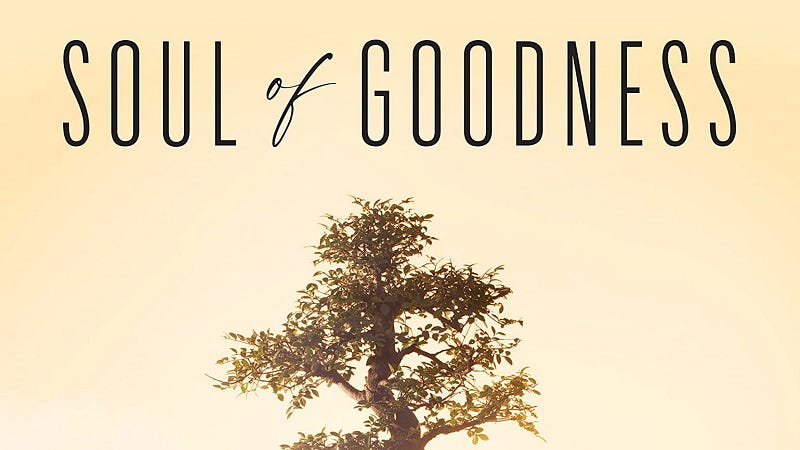Soul of Goodness
Transform Grievous Hurt, Betrayal, and Setback into Love, Joy, and Compassion by Dr. Christopher Phillips

Prometheus, 232 pages
ISBN: 9781633887886
Hardcover: $25.95
Audiobook: $14.95
Regardless of political leanings, it seems reasonable to suggest that global polarization has reached a knife’s edge. For the last century or so, sharp rifts have occurred in the United States, and ripples of the so-called Western world have affected people’s far and wide. So, it is not that the polarized position of modern life is new, but rather that the impacts of its savagery are far more likely to destroy us once and for all. And yet, even within this epoch of misguided fundamentalism and climate catastrophe, change can occur. In fact, it might be true that it is in the midst of the greatest of trials that the deepest changes can take place. In the midst of our greatest pains, the most potent materialization of growth and renewal can occur. And this is why I find Soul of Goodness by Dr. Christopher Phillips so incredibly, beautifully, profound.
As Dr. Cornel West writes of Chris in the stirring forward to Soul of Goodness:
“Christopher Phillips is the greatest living embodiment of the Socratic spirit in our catastrophic times. His global grassroots movement of Socrates Cafés and Democracy Cafés have transformed the lives of millions of people in every continent on the earth. His brilliant and wise books have touched the minds and souls of so many of us. And his soulful style and genuine compassion have enriched the lives of us fortunate ones. When the historians write of the ugly and beautiful in our turbulent age, the Socratic words, works, and deeds of my dearest Brother Christopher Phillips should loom large.”
I first encountered Chris’s work in the form of a mildly-worn copy of Socrates Café in my local used bookstore, sometime around 2014. I remember devouring that book, and thinking to myself that therein lay the seed for the sort of conversations I wanted to have in the world. I read the rest of Chris’s books shortly thereafter, finding especially profound his Constitution Café: Jefferson’s Brew for a True Revolution. But, it was not until 2016 that I returned to the concept of a Socrates Café, or a “Democracy Café” when I found a sudden and urgent need to bring some positive and grounding dialogue into the world.
I started out small, bringing to life an intimate weekly conversation at the local esoteric bookstore. Shortly thereafter, I reached out to Dr. Phillips on random impulse, asking if he could list our café on his website. To my astonishment and delight, he not only did that, he also let me know that he would love to personally attend our Democracy Café and sign books for the group the next time he was in California. That was the beginning of our correspondence, which would soon metamorphize into one of my most treasured friendships (and mentorships, for Chris’s eternally Socratic mode of being continually inspires me toward self-betterment).
My experience with Chris is no one-off experience of chance, but came about because that is who Christopher Phillips fundamentally is: a dialogue-opener, a community builder, and a seeker of the intimate humanity in everything he does. Which is why this latest book, Soul of Goodness, is so important. Within it, Chris offers readers an opportunity to experience through his eyes “some soul of goodness in things evil, would men observingly distill it out” as Shakespeare wrote in Henry V. It is a taste of the remedy for what tries men’s souls, the brew that fosters open social dialogue among diverse voices in the best possible way.
As with Chris’s other works, the book takes shape around a number of conversations that he partook with individuals around the world, from indigenous communities in Mexico to a tea house in Japan. As Chris explores his own reaction to his father’s tragic and horrific death, he finds new outlooks on violence, death, and the nature of evil — which always seem to contain a kernel of some deeper and most potent hope, or goodness. Through these dialogues, Chris builds an idea of possible approaches to the worst life offers, following the great philosopher Socrates’ belief that “No person does wrong willingly.” He seeks, ever-deeper, Socrates’ own enlightened acceptance of the worst in people — even those who sentenced him to death — without rancor or hatred.
Because Chris’s experiences have been so broad, because his encounters with humanity have been so immersive and expansive, the conversations he recounts in this book are imbued with raw emotion and powerful truths of the human heart. Some will make you break down and cry. Others will give you hope for the future in surprising ways. As Veruch, a young Tzotzil woman from an indigenous community in Mexico, tells Chris during one of their exchanges:
“True human beings aren’t perfect. But they do recognize the hurts they’ve caused and try their best to make amends, and never to repeat it. We’re all darkness and light, Christopher. When batsil winic (true human beings) do dark things, they learn from them, so they can better serve the good and the light.”
Through Chris’s flowing literary style, the patient reader will be immersed in a broad landscape of experiences and lives; as he explores different cultures’ concepts of grief, hope, loss, joy, nostalgia, sorrow, and love, we follow and are immersed ourselves. I am reminded of case seventy-Eight of Zen Buddhism’s Blue Cliff Record, when “Sixteen Bodhisattvas enter the bath together and experience enlightenment”. In the same way, the everyday moments, the simplest human connections of Chris’s journeys, lead to the most profound of awakenings. He has observed, distilled, and offered up some soul of goodness in its most potent and form, and has brought light into the world.

